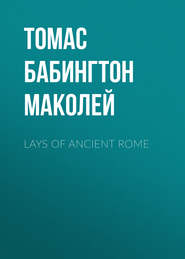По всем вопросам обращайтесь на: info@litportal.ru
(©) 2003-2024.
✖
The History of England, from the Accession of James II — Volume 2
Настройки чтения
Размер шрифта
Высота строк
Поля
633 (return (#x16_x_16_i31))
[ See the pamphlet entitled Letter to a Member of the Convention, and the answer, 1689; Burnet, i. 809.]
634 (return (#x16_x_16_i32))
[ Letter to the Lords of the Council, Jan. 4/14. 1688/9; Clarendon's Diary, Jan 9/19]
635 (return (#x16_x_16_i32))
[ It seems incredible that any man should really have been imposed upon by such nonsense. I therefore think it right to quote Sancroft's words,which are still extant in his own handwriting:
"The political capacity or authority of the King, and his name in the government, are perfect and cannot fail; but his person being human and mortal, and not otherwise privileged than the rest of mankind, is subject to all the defects and failings of it. He may therefore be incapable of directing the government and dispensing the public treasure, &c. either by absence, by infancy, lunacy, deliracy, or apathy, whether by nature or casual infirmity, or lastly, by some invincible prejudices of mind, contracted and fixed by education and habit, with unalterable resolutions superinduced, in matters wholly inconsistent and incompatible with the laws, religion, peace, and true policy of the kingdom. In all these cases (I say) there must be some one or more persons appointed to supply such defect, and vicariously to him, and by his power and authority, to direct public affairs. And this done I say further, that all proceedings, authorities, commissions, grants, &c. issued as formerly, are legal and valid to all intents, and the people's allegiance is the same still, their oaths and obligations no way thwarted.... So long as the government moves by the Kings authority, and in his name, all those sacred ties and settled forms of proceedings are kept, and no man's conscience burthened with anything he needs scruple to undertake."—Tanner MS.; Doyly's Life of Sancroft. It was not altogether without reason that the creatures of James made themselves merry with the good Archbishop's English.]
636 (return (#x16_x_16_i33))
[ Evelyn, Jan. 15. 1688/9.]
637 (return (#x16_x_16_i35))
[ Clarendon's Diary, Dee. 24 1688; Burnet, i. 819.; Proposals humbly offered in behalf of the Princess of Orange, Jan. 28. 1688/9.]
638 (return (#x16_x_16_i38))
[ Burnet, i. 389., and the notes of Speaker Onslow.]
639 (return (#x16_x_16_i38))
[ Evelyn's Diary, Sept. 26. 1672, Oct. 12. 1679, July 13. 1700; Seymour's Survey of London.]
640 (return (#x16_x_16_i38))
[ Burnet, i. 388.; and Speaker Onslow's note.]
641 (return (#x16_x_16_i40))
[ Citters, Jan 22/Feb 1 1689; Grey's Debates.]
642 (return (#x16_x_16_i41))
[ Lords' and Commons' Journals, Jan. 22. 1688; Citters and Clarendon's Diary of the same date.]
643 (return (#x16_x_16_i42))
[ Lords' Journals, Jan. 25. 1683; Clarendon's Diary, Jan. 23. 25.]
644 (return (#x16_x_16_i47))
[ Commons' Journals, Jan. 28. 1688/9; Grey's Debates, Citters Jan 29/Feb 8 If the report in Grey's Debates be correct, Citters must have been misinformed as to Sawyer's speech.]
645 (return (#x16_x_16_i48))
[ Lords' and Commons' Journals, Jan. 29. 1688/9]
646 (return (#x17_x_17_i0))
[ Clarendon's Diary, Jan. 21. 1688/9; Burnet, i. 810; Doyly's Life of Sancroft;]
647 (return (#x17_x_17_i1))
[ See the Act of Uniformity.]
648 (return (#x17_x_17_i7))
[ Stat. 2 Hen. 7. c. I.: Lord Coke's Institutes, part iii. chap i.; Trial of Cook for high treason, in the Collection of State Trials; Burnet, i. 873. and Swift's note.]
649 (return (#x17_x_17_i8))
[ Lords Journals Jan. 29. 1688/9; Clarendon's Diary; Evelyn's Diary; Citters; Eachard's History of the Revolution; Barnet, i. 813.; History of the Reestablishment of the Government, 1689. The numbers of the Contents and Not Contents are not given in the journals, and are differently reported by different writers. I have followed Clarendon, who took the trouble to make out lists of the majority and minority.]
650 (return (#x17_x_17_i9))
[ Grey's Debates; Evelyn's Diary; Life of Archbishop Sharp, by his son; Apology for the New Separation, in a letter to Dr. John Sharp, Archbishop of York, 1691.]
651 (return (#x17_x_17_i12))
[ Lords' Journals, Jan. 30. 1689/8; Clarendon's Diary.]
652 (return (#x17_x_17_i16))
[ Dartmouth's note on Burnet i. 393. Dartmouth says that it was from Fagel that the Lords extracted the hint. This was a slip of the pen very pardonable in a hasty marginal note; but Dalrymple and others ought not to have copied so palpable a blunder. Fagel died in Holland, on the 5th of December 1688, when William was at Salisbury and James at Whitehall. The real person was, I suppose, Dykvelt, Bentinck, or Zulestein, most probably Dykvelt.]
653 (return (#x17_x_17_i17))
[ Both the service and Burnet's sermon are still to be found in our great libraries, and will repay the trouble of perusal.]
654 (return (#x17_x_17_i18))
[ Lords' Journals, Jan. 31. 1688/9.]
655 (return (#x17_x_17_i19))
[ Citters, Feb. 5/15. 1689; Clarendon's Diary, Feb. 2. The story is greatly exaggerated in the work entitled Revolution Politics, an eminently absurd book, yet of some value as a record of the foolish reports of the day. Greys Debates.]
656 (return (#x17_x_17_i20))
[ The letter of James, dated Jan 24/Feb 3 1689, will be found in Kennet. It is most disingenuously garbled in Clarke's Life of James. See Clarendon's Diary, Feb. 2. 4.; Grey's Debates; Lords' Journals, Feb. 2. 4. 1688/9.]
657 (return (#x17_x_17_i21))
Другие электронные книги автора Томас Бабингтон Маколей
Lays of Ancient Rome




 4.67
4.67












